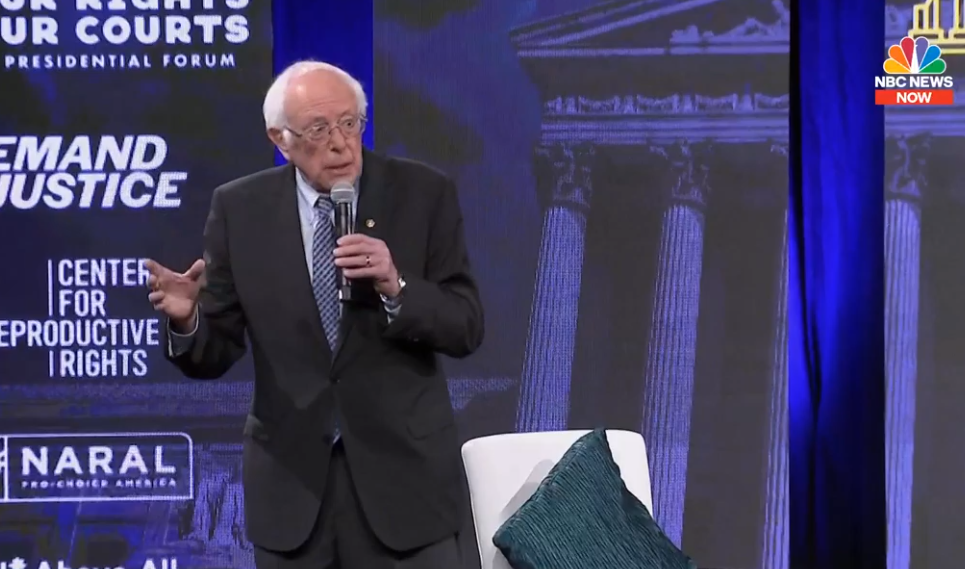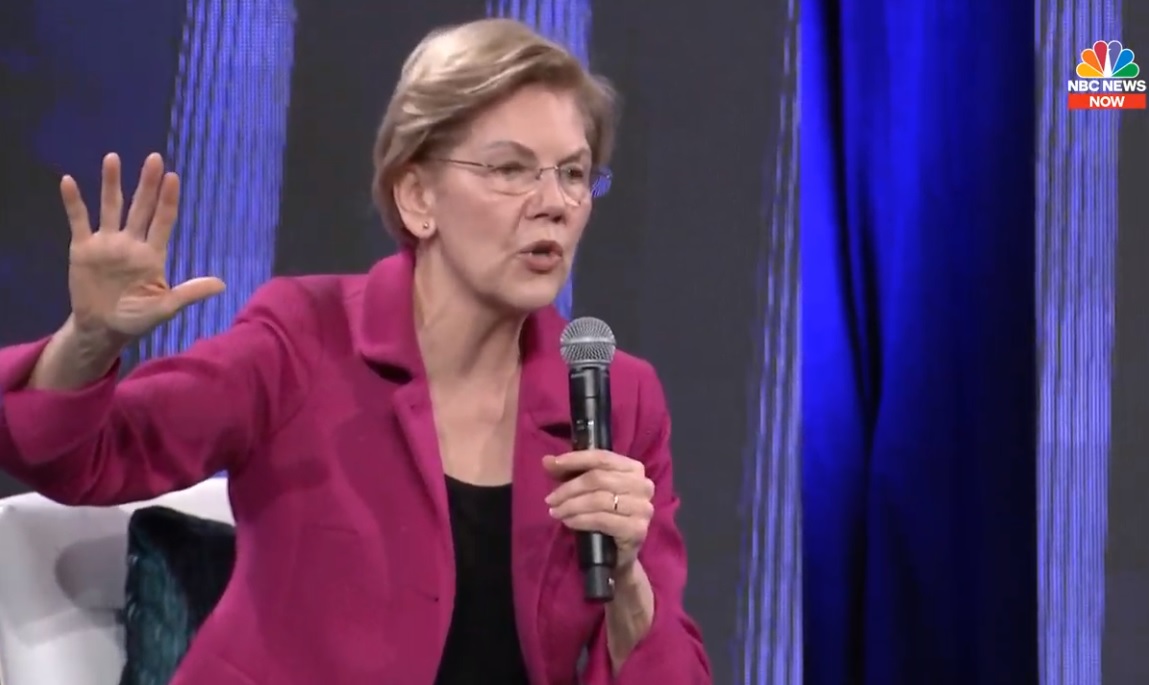2020 Dems Pitch Plans to Fight Trump and McConnell for Control of the Courts
Candidates including Pete Buttigieg and Sens. Bernie Sanders and Elizabeth Warren laid out their plans for overhauling the judicial branch, if elected.
February 08, 2020 at 01:33 PM
6 minute read
The original version of this story was published on National Law Journal
 Democratic presidential candidate Sen. Bernie Sanders speaks at the Our Rights, Our Courts forum in New Hampshire Saturday. (Photo: Our Rights, Our Courts/MSNBC Livestream)
Democratic presidential candidate Sen. Bernie Sanders speaks at the Our Rights, Our Courts forum in New Hampshire Saturday. (Photo: Our Rights, Our Courts/MSNBC Livestream)
Democrats running in the 2020 presidential race have a message to voters about the courts: It's become political, and they want to implement reforms to change that.
"Anyone who says it's not political, I don't believe. I don't believe it," billionaire Tom Steyer said of the U.S. Supreme Court. "Not after Bush v. Gore. Not after what we've seen Mitch McConnell do. It's political. So let's accept that fact and talk about what we're going to do to fight back."
The comments were made by Democrats at the campaign cycle's first dedicated forum on the federal judiciary in New Hampshire on Saturday. Nearly all of the major candidates spoke at the event, with the exception of former Vice President Joe Biden.
The "Our Rights, Our Courts" forum was sponsored by local New Hampshire civic groups, the progressive Demand Justice Initiative, NARAL Pro-Choice and the Center for Reproductive Rights, and had a focus on reproductive rights for women.
Some of the candidates, like Sens. Bernie Sanders of Vermont and Amy Klobuchar of Minnesota and entrepreneur Andrew Yang, said they would have a "litmus test" for judicial nominees when it came to upholding Roe v. Wade. Some, including Sen. Elizabeth Warren of Massachusetts, also called for passing a law establishing a woman's right to an abortion.
MSNBC's Stephanie Ruhle, the forum's main host, repeatedly pushed the candidates on how they would get their judicial nominees approved by a Senate controlled by Senate Majority Leader Mitch McConnell of Kentucky. HuffPost senior political reporter Jennifer Bendery also questioned the participants.
Liberal groups have been pushing to make the judiciary a bigger issue on the political left, and some celebrated the existence of Saturday's forum, which organizers described as the first of its kind.
 Democratic presidential candidate Sen. Elizabeth Warren speaks at the Our Rights, Our Courts forum in New Hampshire Saturday. (Photo: Our Rights, Our Courts/MSNBC Livestream)
Democratic presidential candidate Sen. Elizabeth Warren speaks at the Our Rights, Our Courts forum in New Hampshire Saturday. (Photo: Our Rights, Our Courts/MSNBC Livestream)"I put this on us," Warren said in criticizing Democrats' approach to the courts. "Republicans should have never done this in the first place, but once they started down this path we should have been willing to fight back."
Many of the Democrats decried the judicial nominees tapped by President Donald Trump but acknowledged that there was little they could do to remove them from the bench. Some, like former South Bend, Indiana, Mayor Pete Buttigieg and Yang, floated the idea of adding more seats to the Supreme Court.
Still, the candidates did not provide many concrete details about their plans for the judiciary during their 30-minute speaking slots.
Sanders said McConnell and conservatives "have done a good job of politicizing the courts." He rejected the premise of "packing the courts" but said he wants to explore the idea of having judges rotate on different courts, such as moving them from the Supreme Court to sitting on a circuit court.
Sanders said he has a short list of Supreme Court justices but declined to give their names, quipping, "If I name one, the other 10 will be upset." But Sanders did say he wants justices who are "grounded in the real world" and willing to defend minorities and working Americans.
"The idea that we appoint Supreme Court justices who somehow come down from Mars without any political views is absurd," Sanders said.
Buttigieg said he wants to explore the idea of expanding the Supreme Court to 15 justices, with nominees for three of those seats picked by the other justices.
When asked how he would get judges through a Republican-held Senate, Buttigieg said there must be changes within Congress. He said he would use political pressure, if needed, to get his judicial nominees confirmed to the bench. Steyer also called for political tools to be used in addressing the courts. But he, like other Democrats speaking at the event, refused to accept that it's a given McConnell will still be in control of the Senate in 2021.
Klobuchar, a Senate Judiciary Committee member, said she wants to push for transparency within the federal judiciary: "Everyone should be able to see the Supreme Court when they make decisions about your rights." She also said that she would push for a judicial code of ethics.
Klobuchar said she would not ask the Senate to return to its past rules on judicial nominees, like increasing the time for debate on nominees back up to 30 hours from the two adopted under McConnell's leadership, because doing so wouldn't benefit Democrats in the future.
Klobuchar said she wants to get judicial nominees ready to go as soon as she entered the White House, working in advance with the American Bar Association to find qualified picks for the federal bench.
Other candidates who are polling poorly ahead of New Hampshire's Tuesday primary also spoke at the event.
Sen. Michael Bennet of Colorado defended his votes on judicial nominees, including one against a filibuster on U.S. Supreme Court Justice Neil Gorsuch. "I can defend every single vote that I took, and I take it very seriously because I am a lawyer, I believe in the Constitution, I believe in democracy," he said.
Former Massachusetts Gov. Deval Patrick, the final speaker at the forum, cited his experience appointing judges as governor. He said he sought out nominees who had a mix of legal experience, including as a defense counsel, and he criticized the Supreme Court's 2013 ruling invalidating part of the Voting Rights Act.
"I don't think you can have that balance and conclude, as Chief Justice Roberts had, that all the factual bases for the Voting Rights Act had been overtaken by time," Patrick said.
This content has been archived. It is available through our partners, LexisNexis® and Bloomberg Law.
To view this content, please continue to their sites.
Not a Lexis Subscriber?
Subscribe Now
Not a Bloomberg Law Subscriber?
Subscribe Now
NOT FOR REPRINT
© 2025 ALM Global, LLC, All Rights Reserved. Request academic re-use from www.copyright.com. All other uses, submit a request to [email protected]. For more information visit Asset & Logo Licensing.
You Might Like
View All
Read the Document: DOJ Releases Ex-Special Counsel's Report Explaining Trump Prosecutions
3 minute read
Attorney Sanctioned $9K for Revealing Nude Photos, Other Info in Court Filing
4 minute read
Chicago Cubs' IP Claim to Continue Against Wrigley View Rooftop, Judge Rules
2 minute read
After Solving Problems for Presidents, Ron Klain Now Applying Legal Prowess to Helping Airbnb Overturn NYC Ban
7 minute readTrending Stories
- 1Snapshot Judgement: The Case Against Illustrated Indictments
- 2Texas Supreme Court Grapples Over Fifth Circuit Question on State Usury Law
- 3Exploring the Opportunities and Risks for Generative AI and Corporate Databases: An Introduction
- 4Farella Elevates First Female Firmwide Managing Partners
- 5Family Court 2024 Roundup: Part I
Who Got The Work
J. Brugh Lower of Gibbons has entered an appearance for industrial equipment supplier Devco Corporation in a pending trademark infringement lawsuit. The suit, accusing the defendant of selling knock-off Graco products, was filed Dec. 18 in New Jersey District Court by Rivkin Radler on behalf of Graco Inc. and Graco Minnesota. The case, assigned to U.S. District Judge Zahid N. Quraishi, is 3:24-cv-11294, Graco Inc. et al v. Devco Corporation.
Who Got The Work
Rebecca Maller-Stein and Kent A. Yalowitz of Arnold & Porter Kaye Scholer have entered their appearances for Hanaco Venture Capital and its executives, Lior Prosor and David Frankel, in a pending securities lawsuit. The action, filed on Dec. 24 in New York Southern District Court by Zell, Aron & Co. on behalf of Goldeneye Advisors, accuses the defendants of negligently and fraudulently managing the plaintiff's $1 million investment. The case, assigned to U.S. District Judge Vernon S. Broderick, is 1:24-cv-09918, Goldeneye Advisors, LLC v. Hanaco Venture Capital, Ltd. et al.
Who Got The Work
Attorneys from A&O Shearman has stepped in as defense counsel for Toronto-Dominion Bank and other defendants in a pending securities class action. The suit, filed Dec. 11 in New York Southern District Court by Bleichmar Fonti & Auld, accuses the defendants of concealing the bank's 'pervasive' deficiencies in regards to its compliance with the Bank Secrecy Act and the quality of its anti-money laundering controls. The case, assigned to U.S. District Judge Arun Subramanian, is 1:24-cv-09445, Gonzalez v. The Toronto-Dominion Bank et al.
Who Got The Work
Crown Castle International, a Pennsylvania company providing shared communications infrastructure, has turned to Luke D. Wolf of Gordon Rees Scully Mansukhani to fend off a pending breach-of-contract lawsuit. The court action, filed Nov. 25 in Michigan Eastern District Court by Hooper Hathaway PC on behalf of The Town Residences LLC, accuses Crown Castle of failing to transfer approximately $30,000 in utility payments from T-Mobile in breach of a roof-top lease and assignment agreement. The case, assigned to U.S. District Judge Susan K. Declercq, is 2:24-cv-13131, The Town Residences LLC v. T-Mobile US, Inc. et al.
Who Got The Work
Wilfred P. Coronato and Daniel M. Schwartz of McCarter & English have stepped in as defense counsel to Electrolux Home Products Inc. in a pending product liability lawsuit. The court action, filed Nov. 26 in New York Eastern District Court by Poulos Lopiccolo PC and Nagel Rice LLP on behalf of David Stern, alleges that the defendant's refrigerators’ drawers and shelving repeatedly break and fall apart within months after purchase. The case, assigned to U.S. District Judge Joan M. Azrack, is 2:24-cv-08204, Stern v. Electrolux Home Products, Inc.
Featured Firms
Law Offices of Gary Martin Hays & Associates, P.C.
(470) 294-1674
Law Offices of Mark E. Salomone
(857) 444-6468
Smith & Hassler
(713) 739-1250








